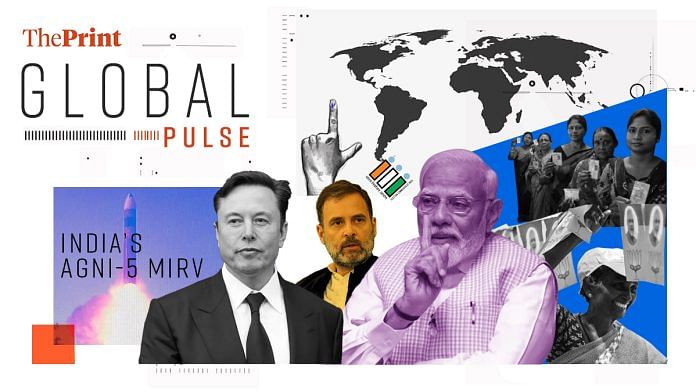New Delhi: The Bharatiya Janata Party (BJP) has made inroads with women voters by offering them “norm-compliant” ways to engage with politics — reversing the party’s “historical deficit” with women — according to Anirvan Chowdhury, a postdoctoral fellow at Harvard University’s Weatherhead Center for International Affairs.
In an article for the Carnegie Endowment for International Peace, Chowdhury writes about how the BJP has countered the notion of politics being dirty, immoral and unsuitable for women under the norms of a patriarchal society. By promoting the idea of seva or service — “a feminine-identified trait”— he argues that the BJP has framed politics as “role-congruent for women”, leading to more families supporting women’s participation.
In a report for Bloomberg, reporters Shruti Srivastava and Abhijit Roy Chowdhury discuss the nine “most-watched” constituencies in the Lok Sabha elections. They talk about the “will he, won’t he” situation with regard to Rahul Gandhi contesting from Amethi, as well as the rise of Tamil Nadu BJP chief and Coimbatore candidate K. Annamalai, the “tough” contest between members of the Pawar family in Baramati, and the Shashi Tharoor-versus-Rajeev Chandrasekhar battle in Thiruvananthapuram.
Ladakh is also marked out as one to watch, due to the rising clamour for statehood and BJP MP Jamyang Tsering Namgyal’s “open rebellion” against his party. The report also makes note of Krishnanagar in West Bengal, where the Trinamool Congress’ Mahua Moitra will face the BJP’s Amrita Roy, who belongs to the area’s erstwhile royal family, as well as the rise of 26-year-old Independent candidate Ravindra Singh Bhati in Barmer.
Highlighting increasing tensions and nuclear proliferation in various regions, particularly focusing on Asia, an article in the South China Morning Post by journalist Tom Hussain discusses how we “live in a much more complicated world today than during the Cold War when the nuclear race was limited to two superpowers”.
The article titled highlights India’s missile capabilities, building, and testing of indigenous weapons, such as the Agni-5’s MIRV (multiple independently targetable re-entry vehicle) capability and its geopolitical implications. It argues that technologies like MIRV “can tempt ambitious national leaders to adopt a more threatening nuclear posture instead of solely relying on such weapons as a deterrent”.
Discussing strategic dynamics, Hussain writes that “India and Pakistan are locked in a multi-headed rocket arms race” and that India’s Agni-5 MIRV test last month “was widely seen by analysts as a response to recent Chinese deployments”.
In a report for Al Jazeera, Suparna Sharma talks about how more and more young graduates — especially those from India’s top institutions — are doing stints in political consultancy while holding out hope for lucrative corporate job offers, a phenomenon she connects to the country’s “depressed job market”. At the same time, cracking competitive exams and studying at top institutions will have prepared them for work in political consultancy, with an understanding of data analysis and the ability to thrive in high-pressure environments.
In the report, Sharma explains how “corporate-style political consultancies began recruiting directly from IITs” to help research voter trends and to find out which politicians are “unhappy and can be brought or bought over”.
Also Read: Mann Ki Baat of ‘friendly uncle’ Modi & AI-powered ‘hyperpersonalised’ election campaign
Musk visits China, Australians rally against violence
Tesla CEO Elon Musk has made a surprise visit to China to discuss the future of self-driving cars in the country. Read Nikkei Asia’s report to know more.
Australians have taken to the streets seeking stricter laws against gender-based violence. Read the BBC’s report on how a wave of violence against women has become a national crisis.
(Edited by Richa Mishra)
Also Read: PM’s speeches at election rallies dominate headlines; a column takes a hard look at judiciary



